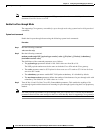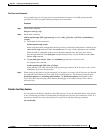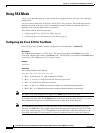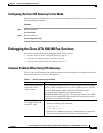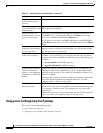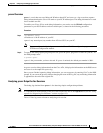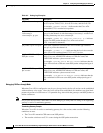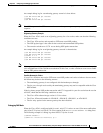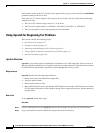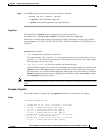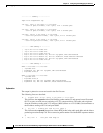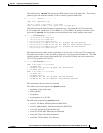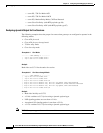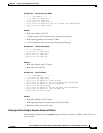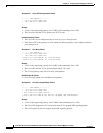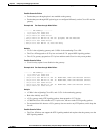
6-12
Cisco ATA 186 and Cisco ATA 188 Analog Telephone Adaptor Administrator’s Guide for MGCP (version 3.0)
OL-4803-01
Chapter 6 Configuring and Debugging Fax Services
Debugging the Cisco ATA 186/188 Fax Services
If the numeric codes for the G.711 codecs do not appear in the log, you need to check your AudioMode
parameter setting on the Cisco ATA.
If the correct G.711 codecs appear in the log but your fax sessions still fail, check that the following
conditions are true:
• The Cisco ATA software image version is 2.14 or above.
• The Cisco ATA model number is ATA186-I1, ATA186-I2, ATA 188-I1, or ATA188-I2.
• The fax relay option for the remote gateways has been disabled.
Using rtpcatch for Diagnosing Fax Problems
This section contains the following topics:
• rtpcatch Overview, page 6-12
• Example of rtpcatch, page 6-13
• Analyzing rtpcatch Output for Fax Sessions, page 6-16
• Using rtpcatch to Analyze Common Causes of Failure, page 6-17
• rtpcatch Limitations, page 6-20
rtpcatch Overview
rtpcatch is a tool that provides comprehensive information for a VoIP connection. The tool runs on a
Microsoft Windows-based PC and is capable of parsing an output capture file from Network Associates
(NAI) Sniffer Pro and identifies significant fax pass-through and fax relay events.
Major functions
rtpcatch includes the following major functions:
• Reads session data from Sniffer Pro capture files.
• Analyzes media streams.
• Stores media streams to files.
• Reports RTP statistics such as the number of RTP packets, the number of RTP frames, the number
of lost packets, the number of filler packets during silence suppression periods, and the number of
erased packets.
How to Use
To use rtpcatch, follow these steps:
Procedure
Step 1 Create a working directory for rtpcatch and place the executable file rtpcatch.exe in this directory.
Step 2 Copy your Network Associates Sniffer Pro capture files into this directory.



